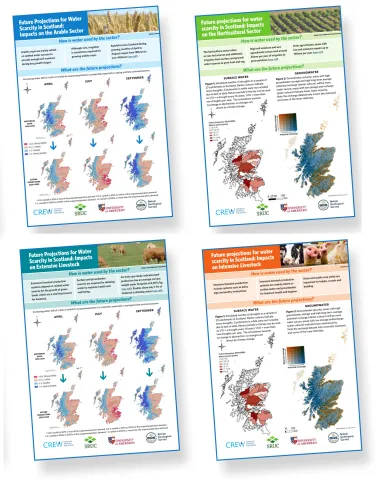
A recent CREW project led by The James Hutton Institute, in collaboration with Scotland’s Rural College, the University of Aberdeen, and the British Geological Survey, highlighted a pressing issue for Scotland: the increasing likelihood and duration of water scarcity events due to climate change. This project, focused on the impact of these changes on three critical sectors—crop production, livestock farming, and distilleries. The findings are vital for understanding future water availability and preparing for water scarcity.
Water resources in Scotland are crucial for various agricultural activities and the world-renowned whisky distilleries. Crop producers and livestock farmers rely heavily on rainfall to nourish barley and grass, essential for both crop yield and animal feed. Surface water from rivers, burns, and lochs, alongside groundwater, is used extensively for irrigating crops, cooling alcohol, and providing drinking water for livestock.
Projections up to 2049 suggest significant reductions in summer and early autumn rainfall, particularly in eastern Scotland, a major agricultural hub. This reduction will likely double the frequency of low river flow events by 2050. For instance, the River Spey, which is important for Scotch whisky production, could see significant low flows increase from once every five years to biennially.
The researchers created a new framework to conduct an initial water security risk assessment, taking into account aquifer storage capacity and recharge rates throughout Scotland. In Eastern and Central Scotland, the long-term average groundwater recharge is expected to decline, increasing the vulnerability of aquifers to long-term depletion.
Stakeholders across various sectors reported that water scarcity is increasingly problematic for their businesses, with negative impacts already being felt. Whilst this project focused on projections for future scenarios, it is important to recognize that significant water scarcity events are already happening:
- Crop Production: Reduced rainfall during critical growth stages leads to lower crop yields and diminished farm incomes. The scarcity of water for irrigation, especially during drought periods, could result in crop failures, particularly for vegetables and fruits.
- Livestock Farming: Reduced grass growth affects feed availability and herd productivity. Additionally, reduced water access and higher temperatures can adversely affect animal health.
- Distilleries: The whisky industry faces potential production halts due to increased low-flow events in rivers, necessitating water restrictions.
To address the impacts of water scarcity across these sectors, stakeholders are implementing measures to mitigate these effects:
- Efficient Irrigation: Adoption of more efficient irrigation methods is encouraged, however introducing more water-demanding crops should be avoided.
- Water Storage: Increasing water storage during winter, when rainfall is projected to increase, can provide a buffer during scarcity events. Rainwater harvesting for livestock use is also a viable option.
- Soil and Groundwater Management: Enhancing soil organic matter can improve water retention, supporting crop growth and promoting groundwater recharge. Nature-based solutions to temporarily hold and percolate water into the ground are also being considered, though their large-scale effectiveness requires further research.
- Technological Advances: The distilling sector is exploring technologies to reduce water usage in cooling processes, though these can be energy intensive.
Despite awareness of these adaptive measures, stakeholders, particularly in crop and livestock sectors, face challenges in implementation. Financial constraints and the need for innovative technologies or new infrastructure pose significant hurdles. The research underscores the need for better data, monitoring, and improved early warning systems to help key Scottish industries adapt to climate change. Scotland's water scarcity challenge necessitates proactive measures across agricultural and distilling sectors to ensure resilience against future droughts. Continued research, stakeholder engagement, and strategic planning will be critical in addressing these emerging water resource challenges.